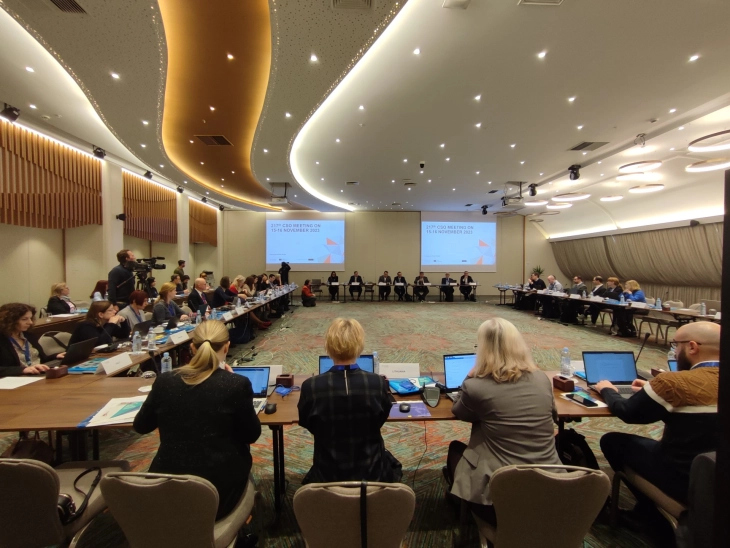Macedonian scientists take lead as most active participants in COST actions among Western Balkan countries
- The Management Committee of COST (European Cooperation in Science and Technology), a funding organisation for research and innovation networks in Europe, is holding its annual meeting Wednesday in Skopje.

Skopje, 15 November 2023 (MIA) - The Management Committee of COST (European Cooperation in Science and Technology), a funding organisation for research and innovation networks in Europe, is holding its annual meeting Wednesday in Skopje.
The agenda includes a workshop on the Horizon Europe, the 10th EU framework programme in research and innovation.
The meeting, attended by the director of the COST Association Ronald de Bruin, was opened by the Deputy PM for European Affairs Bojan Marichikj and the Minister of Education and Science, Jeton Shaqiri.
Marichikj underscored the importance of North Macedonia's participation in COST, emphasizing the necessity to seek opportunities for fostering strong cooperation among scientists and institutions.
“As a country negotiating for full membership in the European Union, we have the opportunity to participate in EU research programmes and experience the benefits even before accession. This encompasses Macedonian researchers in significant projects for innovation, research, and science. Scientific research and the exchange of experiences are of the utmost importance for our society,” Marichikj noted.
He expressed gratitude to the COST Association and its dedication to advancing science. He underscored the government's commitment to providing increased national support for participants in COST. Furthermore, he stated that "by ensuring the efficiency and success of scientists and innovators, we must continue building a European future for North Macedonia, where science and technology play a vital role in shaping a better world for everyone."

Minister of Education and Science Jeton Shaqiri stated that at today's meeting of the COST Management Committee, results from previous actions will be shared, and discussions will also focus on initiatives that could be of interest to member countries of this programme. The goal is to collectively implement these initiatives in the future.
“I am pleased, and it is noteworthy for our country, that in the past period, we have shown substantial interest in joining this programme. In the last two months alone, among the 70 proposed and implemented actions in the COST programme, our country has representatives in 67 actions, achieving a participation rate of 97 percent. As a country, this signifies that we have scientific research potential and a qualified workforce whose ideas and initiatives contribute to the global development of science and technology," Shaqiri noted.
In the future, as he said, "we will make an effort to bring this programme and the opportunities for participation closer to as many young scientists and researchers in the country as possible through presentations and workshops at universities.”
“Certainly, we will make efforts to ensure a more substantial budget for science in the upcoming years. This will be a priority because progress in the country is not achievable without investing in science and the knowledge of citizens,” Shaqiri said.
Representing our country in the COST Management Committee, Prof. Dr. Zoran Popovski pointed out that our scientists are involved in the ongoing actions with an approximately 80 percent participation rate.
“Out of the 45,000 scientists currently engaged in COST networks, Macedonian scientists are involved in approximately 250 such networks. Our scientists make use of various mobility tools as this programme is specifically intended for networking,” Popovski said.
He expressed his expectation that today's meeting would provide proposals on how to increase the impact of COST in the European Research Area, particularly focusing on motivating as many young scientists as possible.

“In addition to the recognition of Macedonian scientists' active participation by COST, we have also been designated as the most active country in the Western Balkans in COST activities,” Popovski noted.
The funding for COST is provided by the European Commission, and on an annual basis, as he said, it amounts to approximately EUR 70 million.
COST (European Cooperation in Science and Technology) is an EU-funded programme which enables researchers and innovators to set up interdisciplinary research networks in Europe and beyond. Established in 1971, it is the longest-running European funding framework for international cooperation in research and science. North Macedonia has been a member of COST since 2002.
Photo: MIA







